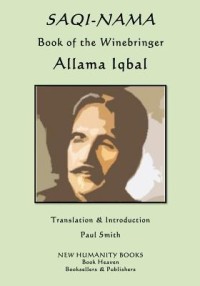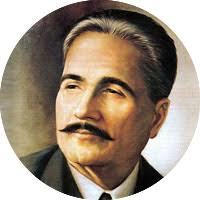
Saqi-Nama
تأليف : Muhammad Iqbal
النوعية : الفكر والثقافة العامة
نعتذر، هذا الكتاب غير متاح حاليًا للتحميل أو القراءة لأن المؤلف أو الناشر لا يسمح بذلك في الوقت الحالي.
Saqi-Nama: Book of the Winebringer by Muhammad Iqbal..SAQI-NAMA (Book of the Winebringer) Allama Iqbal Translation & Introduction Paul Smith (Sir) Muhammad (often called Allama) Iqbal was born in 1877 Sialkot within the Punjab Province of British India (now in Pakistan). During his study in Europe, Iqbal began to write poetry. He prioritized it because he believed he had found an easy way to express his thoughts. The poetry and philosophy of Rumi bore the deepest influence on his mind.
Iqbal's poetry has been translated into many languages, at the time when his work was famous during the early part of the 20th century. He died in 1937. Many of Iqbal's ghazals resemble those of Hafiz and it is through the rhymes and metres he inherited from Hafiz, Ghalib and others, that he expounded his philosophy of Action and the realization of the 'Self'. Iqbal wrote one of the more recent Saqi-namas (a form perfected by Hafiz) in masnavi form in Urdu. 'The central theme of the poem is Muslim Renaissance. Iqbal sketches changing order of the world's political system and laments that Islamic Nations are still devoid of that awakening. He prays to Almighty Allah to bestow Muslims with wisdom and awareness'. Wikipedia. This beautiful translation is in the correct form. Introduction: The Life & Work of Allama Iqbal, Timeline, Genre of the 'Book of the Winebringer' (Saqi-Nama), Bibliography. APPENDIX: Masnavi: From 'The Secrets of Self'... (From the Persian) The Prologue...Large Format 7" x 10" Pages 139. COMMENTS ON PAUL SMITH'S TRANSLATION OF HAFIZ'S 'DIVAN'. "It is not a joke... the English version of ALL the ghazals of Hafiz is a great feat and of paramount importance. I am astonished." Dr. Mir Mohammad Taghavi (Dr. of Literature) Tehran. "Superb translations. 99% Hafiz 1% Paul Smith." Ali Akbar Shapurzman, translator from English to Persian and knower of Hafiz's Divan off by heart. Paul Smith is a poet, author and translator of many books of Sufi poets of the Persian, Arabic, Urdu, Turkish, Pashtu and other languages, including Hafiz, Sadi, Nizami, Rumi, 'Attar, Sana'i, Jahan, Obeyd Zakani, Nesimi, Kabir, Anvari, Ansari, Jami, Khayyam, Rudaki, Yunus Emre, Shah Latif, and many others, as well as his own poetry, fiction, plays, biographies, children's books and screenplays.
Saqi-Nama: Book of the Winebringer by Muhammad Iqbal..SAQI-NAMA (Book of the Winebringer) Allama Iqbal Translation & Introduction Paul Smith (Sir) Muhammad (often called Allama) Iqbal was born in 1877 Sialkot within the Punjab Province of British India (now in Pakistan). During his study in Europe, Iqbal began to write poetry. He prioritized it because he believed he had found an easy way to express his thoughts. The poetry and philosophy of Rumi bore the deepest influence on his mind.
Iqbal's poetry has been translated into many languages, at the time when his work was famous during the early part of the 20th century. He died in 1937. Many of Iqbal's ghazals resemble those of Hafiz and it is through the rhymes and metres he inherited from Hafiz, Ghalib and others, that he expounded his philosophy of Action and the realization of the 'Self'. Iqbal wrote one of the more recent Saqi-namas (a form perfected by Hafiz) in masnavi form in Urdu. 'The central theme of the poem is Muslim Renaissance. Iqbal sketches changing order of the world's political system and laments that Islamic Nations are still devoid of that awakening. He prays to Almighty Allah to bestow Muslims with wisdom and awareness'. Wikipedia. This beautiful translation is in the correct form. Introduction: The Life & Work of Allama Iqbal, Timeline, Genre of the 'Book of the Winebringer' (Saqi-Nama), Bibliography. APPENDIX: Masnavi: From 'The Secrets of Self'... (From the Persian) The Prologue...Large Format 7" x 10" Pages 139. COMMENTS ON PAUL SMITH'S TRANSLATION OF HAFIZ'S 'DIVAN'. "It is not a joke... the English version of ALL the ghazals of Hafiz is a great feat and of paramount importance. I am astonished." Dr. Mir Mohammad Taghavi (Dr. of Literature) Tehran. "Superb translations. 99% Hafiz 1% Paul Smith." Ali Akbar Shapurzman, translator from English to Persian and knower of Hafiz's Divan off by heart. Paul Smith is a poet, author and translator of many books of Sufi poets of the Persian, Arabic, Urdu, Turkish, Pashtu and other languages, including Hafiz, Sadi, Nizami, Rumi, 'Attar, Sana'i, Jahan, Obeyd Zakani, Nesimi, Kabir, Anvari, Ansari, Jami, Khayyam, Rudaki, Yunus Emre, Shah Latif, and many others, as well as his own poetry, fiction, plays, biographies, children's books and screenplays.
المزيد...
